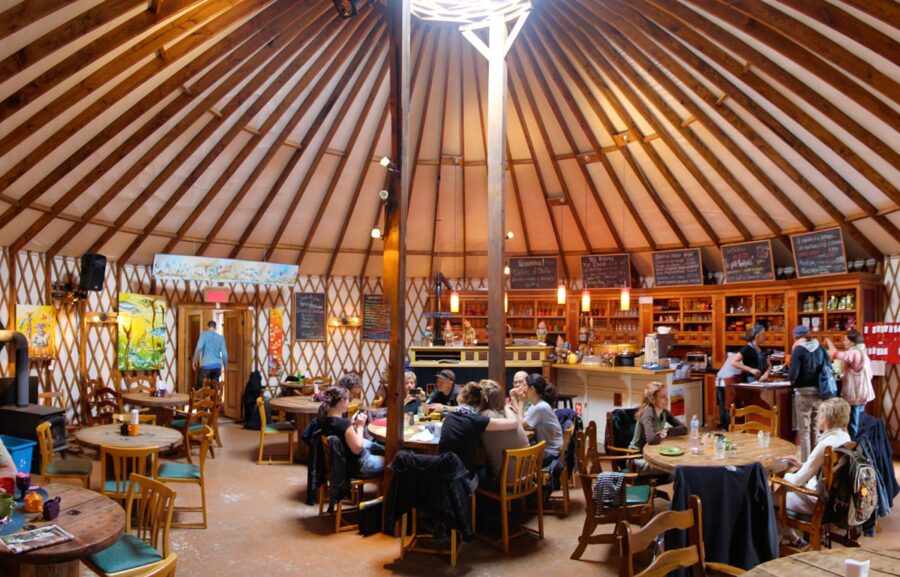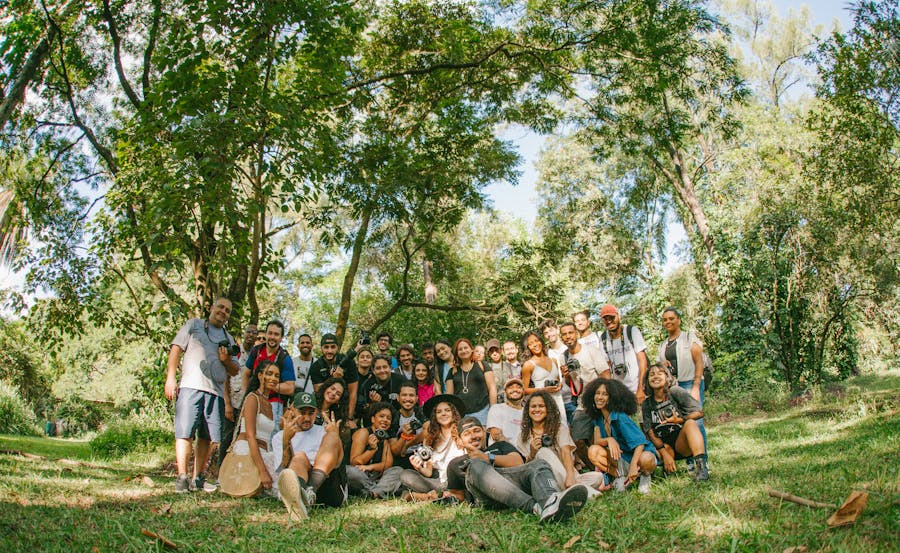
Couchsurfing Alternatives: 7 Unique Platforms for Safer, Deeper Travel Connections
Ever gotten stuck trying to find a place to crash that won’t empty your wallet? Yeah, I’ve been there. There are plenty of Couchsurfing alternatives out there, each offering its own way to connect with locals and score a safe spot—whether you’re after a lively social scene or just a quiet bed.
In my experience, some of these platforms really shake things up—think house sitting, offbeat homestays, or community-driven networks that actually feel safer and more personal. Maybe you’re a backpacker, a solo traveler, or just itching to try something off the usual path. Honestly, there’s something for everyone if you poke around a bit.
Table of Contents
- Key Takeaways
- What Is Couchsurfing and Why Seek Alternatives?
- Overview of Couchsurfing
- Common Reasons for Exploring Alternatives
- Top Couchsurfing Alternatives for Travelers
- BeWelcome
- Trustroots
- Couchers
- Unique Couchsurfing Alternatives for Niche Interests
- Warmshowers for Bicycle Tourists
- Servas for Cultural Exchange
- Host a Sister for Women Travelers
- Hospitality Exchange Networks That Focus on Trust and Safety
- Non-profit Organizations in the Hospitality Space
- Global Communities with Strong Vetting Processes
- Paid Alternatives to Couchsurfing
- Airbnb: Community-Based Paid Accommodation
- Homestay: Live Like a Local
- Worldpackers: Work Exchange Programs
- Platforms for Free Accommodation and House Sitting
- TrustedHousesitters: House-Sitting and Pet-Sitting
- Paired: Social and Cultural Accommodation Experiences
- How to Choose the Right Couchsurfing Alternative
- Evaluating Community Values and Culture
- Safety Considerations for Guests and Hosts
- Matching Your Travel Style and Budget
- Frequently Asked Questions
- What are some free platforms for finding host accommodations similar to Couchsurfing?
- How do budget travelers compare BeWelcome and Couchsurfing in terms of experience and offerings?
- Can you find legitimate accommodation options on Trustroots, and how does it differ from Couchsurfing?
- What has been the overall user reception to BeWelcome as an alternative to Couchsurfing?
- Are there any lesser-known communal living or shared housing platforms that cater to travelers?
- How has the business model for Couchsurfing changed over the years, and what impact does it have on users seeking no-cost accommodations?
- What are some free platforms for finding host accommodations similar to Couchsurfing?
- How do budget travelers compare BeWelcome and Couchsurfing in terms of experience and offerings?
- Can you find legitimate accommodation options on Trustroots, and how does it differ from Couchsurfing?
- What has been the overall user reception to BeWelcome as an alternative to Couchsurfing?
- Are there any lesser-known communal living or shared housing platforms that cater to travelers?
- How has the business model for Couchsurfing changed over the years, and what impact does it have on users seeking no-cost accommodations?
- Book Your Dream Experience
- More Travel Guides
Key Takeaways
- Travelers have a bunch of alternatives to Couchsurfing now.
- Some platforms lean heavily into community, trust, or even niche hobbies.
- The right choice depends on your travel style and what you need from your stay.
What Is Couchsurfing and Why Seek Alternatives?

Couchsurfing made its name by connecting travelers with locals willing to offer a free place to stay, but lately, more people are looking elsewhere. Fees, shifting vibes, and a few other quirks have pushed folks to explore new options.
Overview of Couchsurfing
Couchsurfing kicked off as a way for travelers and hosts to meet up for cultural exchange, save a few bucks, and maybe make a real friend or two. Back in the day, that meant something. It’s still global, and millions have joined over the years.
My first Couchsurfing trip took me to Tbilisi, where my host not only led me to the city’s best khinkali spots but also introduced me to his family cat—a little less welcoming, I’ll admit. Those oddball, genuine moments? You just don’t get them in a hotel or even most Airbnbs.
The site lets you search for hosts, leave references, and join local meetups. You’ll meet all sorts—some have wild stories, others are just curious about travelers from far-off places.
Common Reasons for Exploring Alternatives
Couchsurfing’s paywall, rolled out a few years ago, turned off a lot of loyal users. It changed the whole “open to everyone” vibe that drew people in.
Plenty of folks feel it’s lost its original spirit, too. Profiles sometimes seem more like dating apps than travel communities, and safety concerns have grown. You’ll see travelers in forums debating whether the site feels as friendly or secure as it used to.
Some travelers want platforms that are free or run by non-profits, like BeWelcome or Couchers. Others look for women-only networks or places where volunteering is part of the deal. If you travel often, you want choices that fit your needs, not just the biggest name.
Top Couchsurfing Alternatives for Travelers
Scoring a free, decent place to stay is actually easier now than it was a few years back. Travelers are getting creative, and some hospitality exchange sites really stand out if Couchsurfing’s not your jam.
BeWelcome

If you’re after a community-run, non-profit vibe, BeWelcome is tough to beat. Volunteers, not corporations, keep it running. You sign up for free and connect with locals who genuinely want to host—no sneaky fees or subscriptions.
I’ve used BeWelcome in France, and you really get to know people. The site feels open and friendly, not like it’s trying to sell you something. It’s all about sharing stories and culture.
Sign-up is straightforward. Hosts here seem motivated by genuine kindness, not profit. If you care about community over commerce, BeWelcome deserves a look.
Trustroots

Trustroots brings together like-minded travelers and keeps things super chill. A group of nomads started it, and you can tell—it’s nonprofit, and nobody’s pushing ads or upgrades.
Profiles are basic, which I actually like. Less clutter, more connecting. I once spent an evening deep in conversation with a host in Portugal, just because we both loved hiking.
You join “tribes”—cycling, vegan, artists, whatever—and find your crowd fast. The setup is quick, and the community looks out for each other. Trustroots works best if you’re open to giving back, not just looking for a free bed. No pressure, though—another reason I keep coming back to it.
Couchers

Couchers (couchers.org) is a newer player, but it’s growing quickly and shaking up the scene. It’s a non-profit, totally free, and was built as a direct response to Couchsurfing’s commercial pivot.
People I’ve chatted with say Couchers puts safety and real connections first. They’ve got modern event tools and better ways to screen trustworthy hosts, which is a relief if you’ve had sketchy experiences elsewhere.
They encourage honest reviews and have a clear code of conduct. What stands out for me? They actually listen to traveler feedback. You feel like you’re part of something that wants to grow the right way. If free accommodation and trust matter to you, don’t overlook Couchers.
Unique Couchsurfing Alternatives for Niche Interests
Not everyone’s after the same thing when it comes to hospitality exchange. Whether you’re chasing cycling routes, craving cultural immersion, or need a safe space for women, there’s probably a network built just for you.
Warmshowers for Bicycle Tourists

If you travel by bike, Warmshowers is a bit of a secret weapon. It links bicycle tourists with fellow riders willing to host for free. The catch? It’s only for biking adventures, so you’ve instantly got something in common.
Sign-up is simple. Create a profile, share your route, and search for hosts along the way. Listings mention how “bike-friendly” a place is—garage, tools, or just a much-needed shower (which, after a long ride, is sometimes all you care about).
On my rides through the South, I’ve picked up local tips, home-cooked meals, and even surprise bike repairs. Most hosts are cyclists too. They get what you need—safe space for you and your wheels.
Here’s a quick look at what Warmshowers exchanges:
| What Hosts Offer | What Guests Bring |
|---|---|
| Free place to stay (couch, room, tent spot) | Bike stories & camaraderie |
| Hot shower (usually) | Willingness to share and listen |
| Local biking tips | Respect for house rules |
| Sometimes dinner or repairs | Gratitude and a friendly attitude |
Servas for Cultural Exchange

Servas is a totally different experience. This network’s been around longer than Couchsurfing, aiming to connect travelers and hosts for real cultural exchange, peace, and understanding. It’s not just about a free bed; it’s about learning.
There’s an application, an interview, and a small fee. Feels a bit formal, but honestly, it weeds out the flaky folks. Once you’re in, you get access to hosts in over 100 countries. People here are usually well-traveled and genuinely curious.
What I love about Servas is the slower pace. Hosts often invite you to share a meal or just swap stories. You might end up learning to cook a local dish or getting a firsthand history lesson. If you love languages or want to dive deep into a new culture, Servas is hard to beat.
Host a Sister for Women Travelers

Host a Sister is a Facebook group by women, for women. If you’ve ever felt uneasy about staying with strangers, you’re not alone. This network is just for women (and sometimes kids), making it a safer choice for solo female travelers.
The group’s huge—thousands of members worldwide. Post your travel plans, look for a host, or just ask for local tips. Sometimes members set up meetups, so even if you don’t stay overnight, you might find a walking buddy or coffee date.
Women I’ve met through Host a Sister are usually quick to help—offering couches, safety tips, or just a friendly ear. If you want a community with like-minded women and extra peace of mind, this group’s a real gem.
Just remember: trust and respect are huge here. Ask for references, chat openly, and listen to your gut.
Hospitality Exchange Networks That Focus on Trust and Safety
When you’re staying in a stranger’s home, trust isn’t optional—it’s essential. The right network can mean the difference between a trip you rave about and one you’d rather forget.
Non-profit Organizations in the Hospitality Space
Couchsurfing’s changed a lot. For that old-school, community feel, non-profit networks like BeWelcome and Trustroots really shine. They care about people, not profit, and you can feel the difference when you read user stories or check out their forums.
BeWelcome runs on volunteers. It’s open-source, ad-free, and feels refreshingly genuine. Trustroots came from ex-Couchsurfing hosts who missed that grassroots energy. These platforms are perfect if you want real connections and don’t want to worry about upsells or hidden fees.
You’ll find a global mix of hosts, but also people who actually like swapping stories over tea—not just renting out a spare room. You do need to be proactive—there aren’t millions of listings, so you may have to message a few folks. Safety here isn’t just about rules; it’s about a shared sense of purpose.
Global Communities with Strong Vetting Processes
Safety isn’t just about having rules—it’s about how the community cares and enforces them. If you’re a cyclist, Warmshowers offers a worldwide network of verified hosts, which is a huge plus. For others, there are networks with solid checks in place.
TrustedHousesitters is another interesting angle—mainly for pet or house sitting, but their process is thorough. They check IDs, require reviews, and often set up calls before you ever swap keys. There’s also Servas, which started back in the ’40s and still interviews and checks references for every member. Old-school, but honestly, that’s part of what keeps it safe.
I like knowing someone’s actually read my profile or that there’s accountability before I show up at a stranger’s door. It’s not about being paranoid—it’s just peace of mind. If you’re new, look for communities where hosts and guests vouch for each other, and don’t hesitate to ask questions before you commit. Good networks encourage that kind of openness.
Paid Alternatives to Couchsurfing
If you want to dodge the unpredictability of free hosts but still crave something affordable or a real cultural vibe, there are some solid paid options to consider. Some lean toward privacy and flexibility, while others are all about connecting with locals or learning something new.
Airbnb: Community-Based Paid Accommodation

Airbnb’s the classic choice if you want your own space but still like the idea of living local. You can grab a spare room in someone’s flat or go all out and book an entire place. If you’re splitting with friends, the price can drop pretty low.
Meeting the host is often the best part—sometimes they’ll give you tips you’d never find online or even take you out for a neighborhood walk. You can keep things private with self-check-in, or go for a spot with shared areas if you feel like chatting over coffee. The review system helps you dodge the duds and find a spot that matches your vibe.
If you’re itching to add some fun, you can book tours and attractions right from your phone. I’ve had hosts leave me homemade cookies or point me to the best local food trucks. Those little touches stick with you.
Homestay: Live Like a Local

Homestay lets you pay to stay with local families, which is less about snagging the cheapest bed and more about actually living with people. Think breakfast at the kitchen table, a family dog sniffing your bag, or someone’s grandma quizzing you about your day. It’s a full-on immersive experience.
The twist? Hosts have to be present during your stay. You get real interaction, not just a key under the mat. I once stayed with a retired teacher in Florence who taught me Italian phrases over dinner, then walked me to a gelato spot only locals knew.
If you want to learn to cook a new dish or just see what daily life is like, staying with a family opens that door. Sure, sometimes you’ll feel like a guest—but honestly, that’s the whole point.
Worldpackers: Work Exchange Programs

Worldpackers is for travelers who want to dive in and help out in exchange for a place to sleep—and sometimes meals, too. You might help out at a hostel, garden with locals, or teach English for a few hours a day. It’s not everyone’s cup of tea, but if you’re flexible and want to travel longer without spending much, it’s a game changer.
You pay a yearly fee and unlock hundreds of listings worldwide. You don’t just crash somewhere—you join projects, meet people, and walk away with stories you’ll tell for years. The matching and review system means everyone knows what to expect.
If you want to stretch your adventure, you can score discount flights or other cheap travel deals to get to your next gig. My time volunteering in Lisbon led to a big group dinner and a behind-the-scenes food crawl—stuff I never would’ve stumbled onto alone. If you value connection as much as a comfy bed, this approach feels purposeful.
Platforms for Free Accommodation and House Sitting
If you’re after free places to stay or want something more meaningful than a hotel, there are clever ways to land a bed without spending a cent. These options can make your trip cheaper—and way more memorable. Sometimes you’ll end up living like a local, not just passing through.
TrustedHousesitters: House-Sitting and Pet-Sitting

TrustedHousesitters is honestly a game-changer for free accommodation. You look after someone’s home—and often their pets—while they’re away. In return, you get to stay there rent-free, just with a bit of responsibility. Imagine waking up in a London flat or a Spanish villa with only a dog or cat for company.
I once watched two greyhounds outside Edinburgh for a week. It was quieter than any hostel, and the owners left me a list of their favorite bakeries and hidden picnic spots. I ended up settling into the neighborhood, not just ticking off tourist sites. Some gigs last just a few days, others a month or more. You’ll need to like animals for this one. The annual membership fee pays for itself after just one stay.
Here’s what you’re usually signing up for:
| Requirement | Details |
|---|---|
| Accommodation Cost | Free for sitters (after membership fee) |
| Usual Duties | Pet care, house care |
| Typical Length | Few days to several months |
| Who It’s Good For | Animal lovers, slower travelers |
Paired: Social and Cultural Accommodation Experiences
Paired flies under the radar, but honestly, it deserves more buzz. The platform connects you with hosts who want to share their daily life, not just give you a bed. You might share meals, tag along to a football match, or just hang out making pancakes on a lazy Sunday.
You’re not just a guest—it’s more like staying with distant relatives you haven’t met yet. There’s a mix of new foods, stories, and sometimes a few awkward language fails (we’ve all been there). Most hosts aren’t looking for money—just a bit of curiosity and your own story to share. If you’d rather hear about a city from locals than read another bland travel guide, Paired is worth a shot.
I stayed with a family in Prague through Paired and ended up at an underground jazz club their neighbor suggested. That night never would’ve happened if I’d just booked a hostel. If you’re after real connections, you should give this one a go.
How to Choose the Right Couchsurfing Alternative

What’s the best platform? That really depends on what matters most to you—community, safety, or your own travel style. Not all alternatives are created equal; each one brings its own vibe and perks, especially if you care about culture or you’re pinching pennies.
Evaluating Community Values and Culture
Start by peeking into the soul of each platform. Places like BeWelcome or Couchers run on community spirit and cultural exchange, not just free beds. I always poke around their forums or chats first. If everyone’s silent or only talks about saving money, it feels a bit hollow. Look for hosts who want to share stories or cook dinner together. That’s where the magic happens.
Sometimes platforms have a code of conduct or a mission statement—take a look. If you dream of music nights or being shown around by a local, pick a platform that encourages social connections. Hosts who fill out detailed profiles or share why they love hosting usually signal a better experience.
Safety Considerations for Guests and Hosts
Safety isn’t just a buzzword—it’s non-negotiable. Some platforms do ID checks or use references, which is basically like getting a friend’s opinion before you meet someone. When I first started hosting, guest reviews really helped me feel at ease.
Always read reviews, not just the star ratings. Real stories tell you more than any number can. If you spot repeated mentions of awkward moments or last-minute cancellations, consider that a warning. Many sites let you message hosts or guests before confirming—use that time to ask about the living setup or house rules. If your gut says no, trust it. You can always walk away, and your safety is worth more than a free bed.
Matching Your Travel Style and Budget
Think about how you like to travel before signing up anywhere. If you’re a planner who needs all the details, stick to networks with good communication tools and hosts who share plenty up front. If you’re super social, look for sites with meetups or shared events. Solo travelers often benefit from hosts who offer tips or want to explore together.
Budget matters, too. Some alternatives are totally free (like BeWelcome or Couchers), run by volunteers. Others have small membership fees or optional “verification.” Sometimes paying a little extra means a safer or more supportive community. If you’re counting every penny, double-check for hidden costs before you book.
Here’s a quick reference:
| Platform Type | Cost | Best for |
|---|---|---|
| Non-profit/Volunteer (e.g. BeWelcome, Couchers) | Free | Cultural experience, community vibes |
| Hybrid (some features free, some paid) | Low/Optional | Budget travelers, frequent users |
| Commercial (premium options) | Paid/Subscription | Flexible travelers, those who want extras |
Pick what fits your style—not just what’s trendy. Your comfort always comes first.
Frequently Asked Questions
If Couchsurfing’s fees turned you off or you just want more options, don’t worry—there are plenty of alternatives that long-term travelers actually prefer. Each platform has its own quirks, strengths, and community, and that can really shape your experience out there.
What are some free platforms for finding host accommodations similar to Couchsurfing?
BeWelcome and Trustroots let you search for and message hosts without paying. They’re run by volunteers, with no paywalls or sneaky charges.
WarmShowers is another one, mostly for cyclists but sometimes open to everyone. It’s about real hospitality, not squeezing your wallet.
How do budget travelers compare BeWelcome and Couchsurfing in terms of experience and offerings?
Some folks say BeWelcome feels like old-school Couchsurfing—less slick, but open source and volunteer-run. If you miss the early days of Couchsurfing, BeWelcome might give you that throwback feeling.
There aren’t as many hosts, but those who are active seem to care about cultural exchange, not just free accommodation. You might wait longer for replies, though.
Can you find legitimate accommodation options on Trustroots, and how does it differ from Couchsurfing?
Trustroots is legit, not just some empty site. It started for hitchhikers and alternative travelers, so the vibe is super relaxed and open.
It’s non-commercial and free, but the user base is smaller than Couchsurfing’s. In big cities, you’ll find options, but in smaller places, you might have to get creative.
What has been the overall user reception to BeWelcome as an alternative to Couchsurfing?
Most people land on BeWelcome because they’re over Couchsurfing’s paywalls and want something simpler. The community feels more transparent and democratic, even if the site’s a bit clunky or lacks a flashy app.
You’ll meet people who actually care about sharing, and I’ve made a couple of real friends there who ditched Couchsurfing years ago.
Host A Sister is a great one for women—hosts only, very supportive vibe. CultureGoGo and MovingWorlds focus more on cultural exchange or skill-sharing than just free beds.
Don’t forget about Facebook groups for communal living swaps, intentional communities, or creative house shares. If you dig around, you’ll be surprised at what you can find.
How has the business model for Couchsurfing changed over the years, and what impact does it have on users seeking no-cost accommodations?
Couchsurfing rolled out a paid membership model not too long ago, and honestly, that surprised a lot of veteran users—including me. Back in the day, it really was the gold standard for free hospitality.
Now, you’ve got to pay a monthly or yearly fee just to message hosts. That paywall has nudged plenty of budget travelers to start poking around for alternatives.
The vibe’s changed, too. Couchsurfing feels less spontaneous and more like any other booking platform, which, if you ask me, takes away some of the magic that made it special in the first place.
What are some free platforms for finding host accommodations similar to Couchsurfing?
BeWelcome and Trustroots let you search for and message hosts without paying. They’re run by volunteers, with no paywalls or sneaky charges.
WarmShowers is another one, mostly for cyclists but sometimes open to everyone. It’s about real hospitality, not squeezing your wallet.
How do budget travelers compare BeWelcome and Couchsurfing in terms of experience and offerings?
Some folks say BeWelcome feels like old-school Couchsurfing—less slick, but open source and volunteer-run. If you miss the early days of Couchsurfing, BeWelcome might give you that throwback feeling.
There aren’t as many hosts, but those who are active seem to care about cultural exchange, not just free accommodation. You might wait longer for replies, though.
Can you find legitimate accommodation options on Trustroots, and how does it differ from Couchsurfing?
Trustroots is legit, not just some empty site. It started for hitchhikers and alternative travelers, so the vibe is super relaxed and open.
It’s non-commercial and free, but the user base is smaller than Couchsurfing’s. In big cities, you’ll find options, but in smaller places, you might have to get creative.
What has been the overall user reception to BeWelcome as an alternative to Couchsurfing?
Most people land on BeWelcome because they’re over Couchsurfing’s paywalls and want something simpler. The community feels more transparent and democratic, even if the site’s a bit clunky or lacks a flashy app.
You’ll meet people who actually care about sharing, and I’ve made a couple of real friends there who ditched Couchsurfing years ago.
Host A Sister is a great one for women—hosts only, very supportive vibe. CultureGoGo and MovingWorlds focus more on cultural exchange or skill-sharing than just free beds.
Don’t forget about Facebook groups for communal living swaps, intentional communities, or creative house shares. If you dig around, you’ll be surprised at what you can find.
How has the business model for Couchsurfing changed over the years, and what impact does it have on users seeking no-cost accommodations?
Couchsurfing rolled out a paid membership model not too long ago, and honestly, that surprised a lot of veteran users—including me. Back in the day, it really was the gold standard for free hospitality.
Now, you’ve got to pay a monthly or yearly fee just to message hosts. That paywall has nudged plenty of budget travelers to start poking around for alternatives.
The vibe’s changed, too. Couchsurfing feels less spontaneous and more like any other booking platform, which, if you ask me, takes away some of the magic that made it special in the first place.



